Friday October 5, 2007
It just got dark within the last hour, and I have been sitting on my balcony visually eavesdropping on some folks, because I am enjoying what I see. The poorest families from my neighborhood are gathered on a huge rug on the sidewalk sharing a meal. I recognize them--the little boy and old man who collect empty bottles and live in the lean-to in the alley across from my building, my own doorman and his family, the man who cleans cars for the dealership on the corner, and the woman who sells newspapers in the early morning.
The food was prepared, or possibly catered, by those who can afford to be generous. It is being carried out of the dealership, so I think maybe the owners are the providers for this meal. The occasion is Ramadan.
All month long, Muslim believers fast through the daylight hours, so the meal at sundown, called Iftar, is enjoyed with gusto. Egyptian people, who I have already found to be generous, are even more giving during this month. The greeting for Ramadan, "Ramadan Kareem" means, “May Allah make your Ramadan observance a generous occasion."
In the true spirit of the fasting, one is supposed to think of the poor, as well as performing a rite that ensures favor with Allah. All over town I see temporary tents made of wooden frames and covered with colorful fabric and rugs. Inside are tables and folding chairs. The purpose of these “temporary kitchens” is the same as the rug-table set up on my sidewalk. Anyone can walk in during Iftar and eat. Restaurants provide free food, also women form cooking brigades and help to provide. Of course, anyone so moved by the spirit can pitch in to provide food.
At the beginning and end of the month of Ramadan, people give gifts of cash and food to their doorman, cleaning lady, drivers and others who serve throughout the year.
Brightly colored lights hang from the high tops of mosques and in store windows, reminding westerners of Christmas lights. A bright, red-print fabric is often draped in windows. Huge lanterns with stained glass panels sit in windows of offices and homes. Bakeries make special sweets, dripping with sugar or honey and coconut, nuts, or chocolate. Some of these fabulous confections you will only see during Ramadan.
I shopped for nuts and dried fruits to give to the people in my life, along with a little money over the usual cost of their services. They seemed surprised by my participation, since they have only known me for thirty days. It helped that my co-teacher has lived here a year already and gave me a heads-up on what to do! I received warm handshakes and thank you's from the men and double-cheek kisses from the women. This part of Ramadan is good.
The downside--the business day is shorter, making it difficult to do banking and shopping after work. Traffic is thicker, late-afternoon fasters are getting irritable, especially the smokers, and I go all day without snacking or even drinking water in my classroom, because most students are fasting. Also, families get together for large feasts and fellowship during the late night hours, so my students are sleepy and hungry and whiney by afternoon--small inconveniences for such an important time.
One day I did learn a lesson. I decided to spend an afternoon shopping with a friend who is Muslim. We had the bright idea to purposely get off at the wrong metro stop to see the community, thinking it could only be a short distance from our own neighborhood, since it was only one stop beyond our usual.
When we got off the train, it was a though we had stepped back in time. The streets were dusty and alive with fruit sellers, trades of all kinds, meats, breads, all on the sidewalk--and not a tourist in sight--I loved it.
We bought bread the moment it was ladled out of the underground oven. We shooed flies away and bought huge grapes. Later, I realized it was well over 90 degrees, lunch had been a long time ago, and I was ready to be home.
My friend agreed, so we stopped a taxi and headed into the worst, gridlock traffic jam I have ever seen, including New York City. Several taxi drivers were face to face, arguing in the street and refusing to move the few inches that would have released the lock. I reached for my window crank; it was missing.
I looked through the window and saw a lemonade stand, right there on the corner. A huge ice-filled lemonade jug stood on a rickety table. The tap dripped with the refreshing liquid. I could have touched it had I been able to roll down my window.
I remembered that I had a bottle of water in my purse, a necessity that one always carries in this desert. But, I was with someone who was fasting, and my conscious bothered me. I decided not to take it out in front her, or the taxi driver.
Then my friend noticed the juice stand. She said, "Boy, a nice, cold glass of lemonade sure would taste good right now." I drank the sweat that was pouring from my upper lip and silently vowed not to spend another afternoon with her until after October 14th. Ramadan Kareem.
It just got dark within the last hour, and I have been sitting on my balcony visually eavesdropping on some folks, because I am enjoying what I see. The poorest families from my neighborhood are gathered on a huge rug on the sidewalk sharing a meal. I recognize them--the little boy and old man who collect empty bottles and live in the lean-to in the alley across from my building, my own doorman and his family, the man who cleans cars for the dealership on the corner, and the woman who sells newspapers in the early morning.
The food was prepared, or possibly catered, by those who can afford to be generous. It is being carried out of the dealership, so I think maybe the owners are the providers for this meal. The occasion is Ramadan.
All month long, Muslim believers fast through the daylight hours, so the meal at sundown, called Iftar, is enjoyed with gusto. Egyptian people, who I have already found to be generous, are even more giving during this month. The greeting for Ramadan, "Ramadan Kareem" means, “May Allah make your Ramadan observance a generous occasion."
In the true spirit of the fasting, one is supposed to think of the poor, as well as performing a rite that ensures favor with Allah. All over town I see temporary tents made of wooden frames and covered with colorful fabric and rugs. Inside are tables and folding chairs. The purpose of these “temporary kitchens” is the same as the rug-table set up on my sidewalk. Anyone can walk in during Iftar and eat. Restaurants provide free food, also women form cooking brigades and help to provide. Of course, anyone so moved by the spirit can pitch in to provide food.
At the beginning and end of the month of Ramadan, people give gifts of cash and food to their doorman, cleaning lady, drivers and others who serve throughout the year.
Brightly colored lights hang from the high tops of mosques and in store windows, reminding westerners of Christmas lights. A bright, red-print fabric is often draped in windows. Huge lanterns with stained glass panels sit in windows of offices and homes. Bakeries make special sweets, dripping with sugar or honey and coconut, nuts, or chocolate. Some of these fabulous confections you will only see during Ramadan.
I shopped for nuts and dried fruits to give to the people in my life, along with a little money over the usual cost of their services. They seemed surprised by my participation, since they have only known me for thirty days. It helped that my co-teacher has lived here a year already and gave me a heads-up on what to do! I received warm handshakes and thank you's from the men and double-cheek kisses from the women. This part of Ramadan is good.
The downside--the business day is shorter, making it difficult to do banking and shopping after work. Traffic is thicker, late-afternoon fasters are getting irritable, especially the smokers, and I go all day without snacking or even drinking water in my classroom, because most students are fasting. Also, families get together for large feasts and fellowship during the late night hours, so my students are sleepy and hungry and whiney by afternoon--small inconveniences for such an important time.
One day I did learn a lesson. I decided to spend an afternoon shopping with a friend who is Muslim. We had the bright idea to purposely get off at the wrong metro stop to see the community, thinking it could only be a short distance from our own neighborhood, since it was only one stop beyond our usual.
When we got off the train, it was a though we had stepped back in time. The streets were dusty and alive with fruit sellers, trades of all kinds, meats, breads, all on the sidewalk--and not a tourist in sight--I loved it.
We bought bread the moment it was ladled out of the underground oven. We shooed flies away and bought huge grapes. Later, I realized it was well over 90 degrees, lunch had been a long time ago, and I was ready to be home.
My friend agreed, so we stopped a taxi and headed into the worst, gridlock traffic jam I have ever seen, including New York City. Several taxi drivers were face to face, arguing in the street and refusing to move the few inches that would have released the lock. I reached for my window crank; it was missing.
I looked through the window and saw a lemonade stand, right there on the corner. A huge ice-filled lemonade jug stood on a rickety table. The tap dripped with the refreshing liquid. I could have touched it had I been able to roll down my window.
I remembered that I had a bottle of water in my purse, a necessity that one always carries in this desert. But, I was with someone who was fasting, and my conscious bothered me. I decided not to take it out in front her, or the taxi driver.
Then my friend noticed the juice stand. She said, "Boy, a nice, cold glass of lemonade sure would taste good right now." I drank the sweat that was pouring from my upper lip and silently vowed not to spend another afternoon with her until after October 14th. Ramadan Kareem.




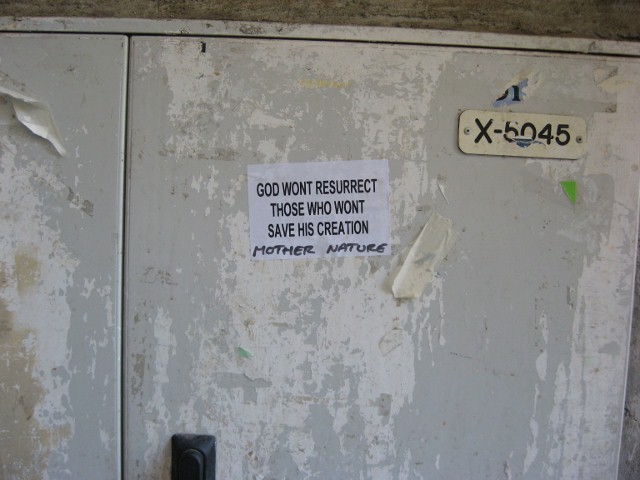

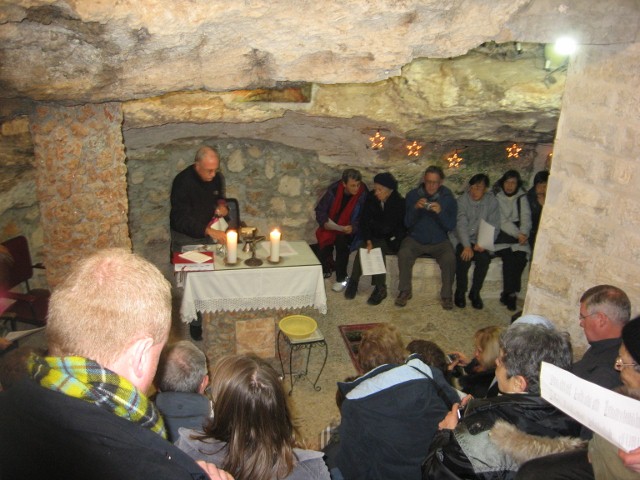

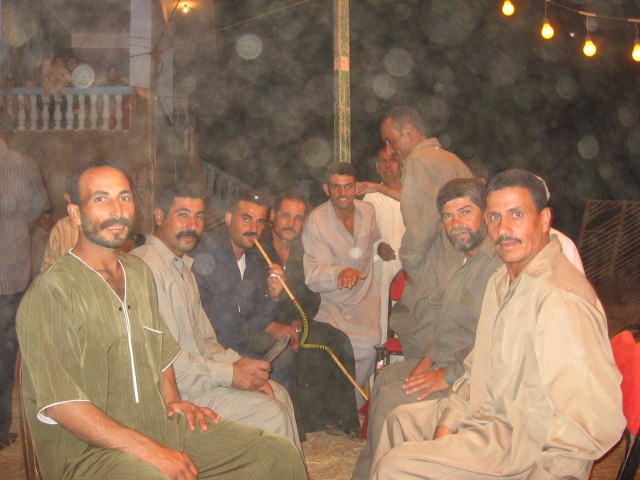.jpg)
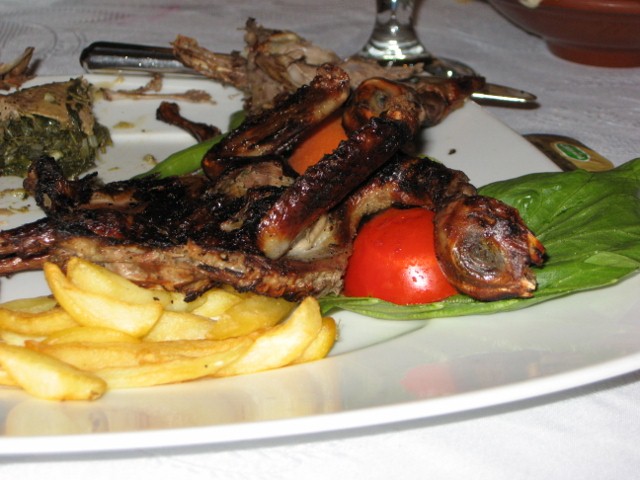.jpg)
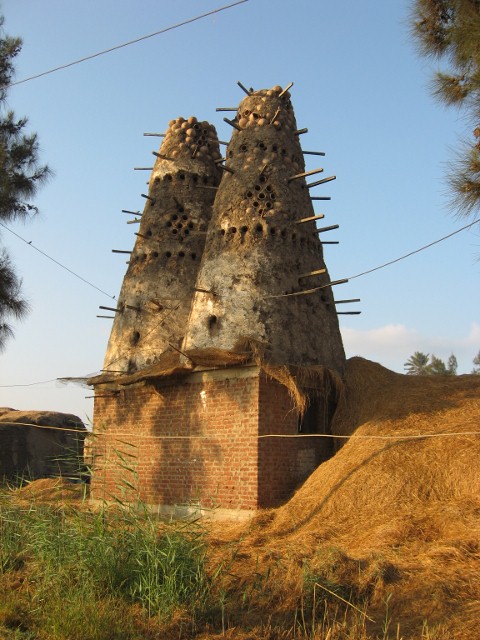.jpg)
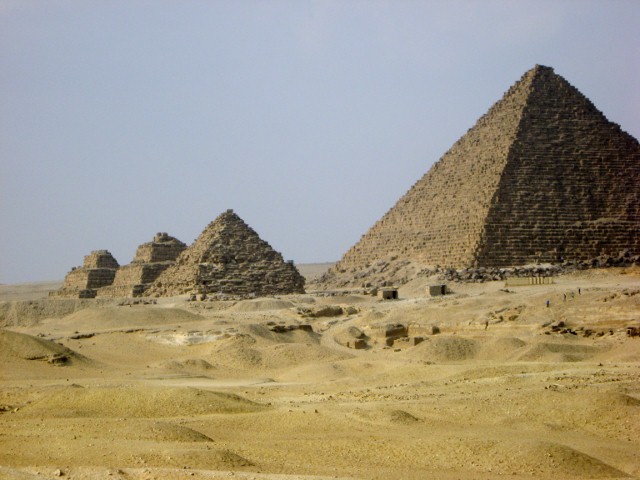.jpg)